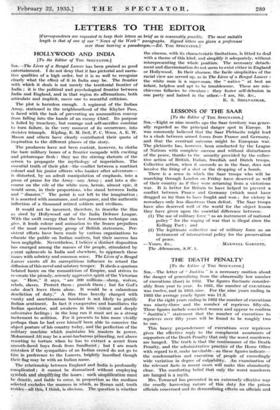LETTERS TO THE EDITOR fCcrrrespondents are requested to keep their
letters as brief as is reasonably possible. The most suitable lcngth is that of one of our "News of the Week" paragraphs. Signed letters are given a preference" over those bearing a pseudonym.—Ed. THE SPECTATOR.I _ -HOLLYWOOD AND INDIA [To the Editor of THE SPECTATOR.] Srit,—The Lives of a Bengal Lancer has been praised as good entertainment. I do not deny that it has pictorial and narra- tive qualities of a high order, but it is as well to recognize clearly what the effect of it In India may be. The frontier with which it deals is not merely the territorial frontier of India ; it ,is the political and, psychological frontier between India and England, and in that region its affirmations, both articulate and implicit, move one to resentful criticism.
The plot is harmless enough. A regiment of the -Indian Army, stationed in the neighbourhood of the Khyber Pass, is faced with the task of preventing an ammunition convoy from falling into the hands of an enemy Chief. Its purpose is foiled by treachery, but courage and self-sacrifice combine to turn failure, in the very moment of its occurrence, into decisive triumph. Kipling, E. M. Dell; P. C. Wren, A. E. W. Mason and others have clearly contributed their quota of inspiration to the different phases of the story.- The producers have not been content, however, to clothe the bare military bones of a frontier 'escapade with exciting and picturesque flesh : they use the stirring rhetoric of the screen to propagate the mythology of imperialism. The essential truth of their plot—the conflict between a martinet colonel and his junior officers who hanker after adventure— is distorted, by an adroit manipulation of emphasis, into a pwan of praise for the Army—any Army'; and into a dis- course on the role of the white men, heroic, almost epic, it would seem, in their proportions, who stand between India and "disaster." The point is not left to the imagination ; it is asserted with assurance, and arroganee, and the authentic inflection of a thousand retired soldiers arid civilians.
It would not be incorrect, therefore, to describe the film as sired by _Hollywood out of the India Defence League. With the swift energy that the best American technique can give, it lends Colour and animation to the frozen prejudices of the most reactionary group of British statesmen. Per- sistent efforts have been made by Various organizations to educate the public on Indian matters, but their success has been negligible. Nevertheless, I believe a distinct disposition has emerged among the masses of the people, stimulated by r2cent upheavals in India and elsewhere, to approach these 'issues with Sobriety and common sense. The Lives of a Bengal Lancer exerts all its surreptitious influence to retard the diffusion of this novel arid salutary temPer. If sheds a spurious belated lustre on the romanticism of Empire, and strives to re-create the piously, serenely aggressive spirit of the Victorian age. "Here," it says, "are 300 millions—sheep, wolves, rebels, slaves. Protect them ; punish them ; but for God's sake don't leave them alone. It would be a calamitous dereliction of duty." A film thus heavily charged with vanity and sanctimonious bombast is not likely to gratify Indian sentiment. In fact it exasperates and humiliates the Indian spectator, arid awakens in him violent and deeply subversive feelings; in the long run it must act as a strong incitement to sedition. For it presents to him more vividly perhaps than he had ever himself been able to conceive the abject posture of his country today, and the perfection of the military . machine which maintains his masters in power. Mohammed Ali may be a semi barbarous princeling, not above resorting to torture when he has to extract a secret from Smooth-faced boys fresh from Sandhurst ; but I am much mistaken if the sympathies of an Indian crowd do not go to lain in preference to the Lancers, brightly inscribed though their flag may be with an Indian name.
. The relationship between England and India is profoundly eom_plicated ; it cannot be dramatized without employing symbols and simplifying the issues ; such simplification must be,drastic, and liable to error, in proportion as the medium selected excludes the nuances in which, as Renan said, truth resides—all this, I think, is obvious. The question is whether
the cinema, with its characteristic limitations, is fitted to deal with a theme of this kind, and simplify it adequately, without misrepresenting the whole position. The necessary detach- ment and discrimination do not seem to exist either in England or Hollywood. In their absence, the facile simplicities of the racial view are served up, as in The Lives of a Bengal Lancer : the white man is a super-man, the " native " at best an infant, helpless and apt to be troublesome. These are mis- chievous fallacies to circulate : - they foster self-delusion in one party and hatred in the other.—I am, Sir, &c., K. S. SHELVANRAR.


















































 Previous page
Previous page